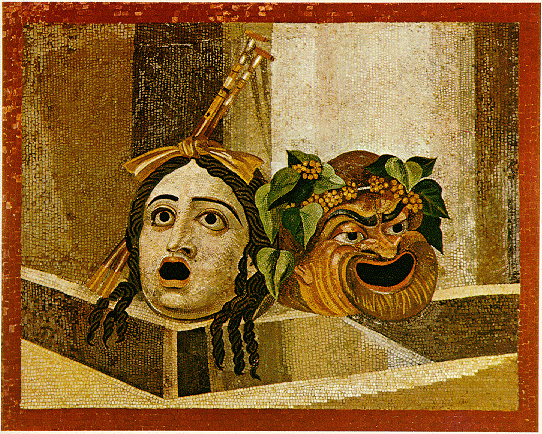
Why Study Latin?
Why Study Latin?
Why Study Latin?
Click on a question mark to see why others think it's important to study Latin!



Please click on the link below to download the "WHY STUDY LATIN? WHY NOT?" brochure seen to the left of this text.
Click on a slide to stop it and
enlarge it to make it easier to read.
1. Improve Your Vocabulary!
Approximately 67% of all English words have their origin in the Latin language. The English language even contains a large number of actual Latin words which have not changed (in meaning or spelling) since the time of the Romans. There are at least 333 of these words! Here is a sampling:

2. Travel Through Time!
Meet gladiators and soldiers, poets and lovers, emperors and slaves. Find out what it was like to have lived over 2,000 years ago!
3. Learn More About Your Own History!
So many aspects of our lives today can be traced back to the ancient Romans: government, laws, architecture, and art just to name some! Understand today's world by studying yesterday's. After all, isn't it said that "history repeats itself"?
4. Learning Latin is a Great Start To Learning Other Languages!
Up to 80% of all words in in French, Spanish, Italian, & Portuguese (theROMANce languages) come from Latin.
5. Learn More About Your Own Language!
With Latin, you will learn how languages work. You may even learn things about your own language in Latin class before you learn them in English class.
6. Careers! (Just to name a few!)
Teaching: There is almost always a shortage of certified Latin teachers.
Law: Much of our legal system has its roots in ancient Rome. Legal vocabulary is
steeped in Latin. Such terms as habeas corpus, nolo contendere, prima facie,
corpus delicti and amicus curiae are a part of the everyday Latin vocabulary of
practicing lawyers.
Medicine: Did you know that the Language of medicine for over a thousand
years was Latin? What an advantage a pre-med student or nursing student who has
studied Latin has over those who have not!
Pharmacy: The pharmacist deals with Latin terms and phrases on a daily basis.
Journalism: The ability to communicate with an extensive vocabulary and a firm command of grammar is essential for success in the field of journalism. Study in Latin significantly improves these all-important skills.
Archaeology: For those who would like to work in the fascinating field of archaeology and specialize in Greece or Rome, a reading knowledge of Latin is a must!
Linguistics: Linguistics is the study of how language works. Since Latin has influenced so many other languages, its importance is clear for this field as well.
Ancient History: If you are serious about history you will want to use primary sources (i.e. those written in Latin).
Art, Literature and Drama: In literature, music, painting, sculpture and drama there are countless references to the worlds of ancient Greece and Rome. The student equipped with the study of Latin will most likely understand these historical and mythological illusions.










